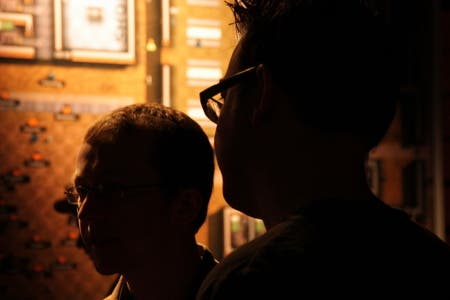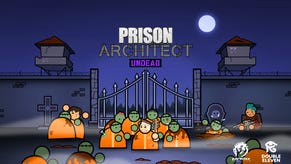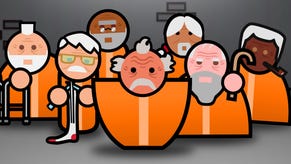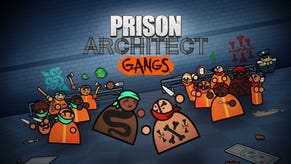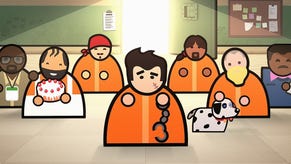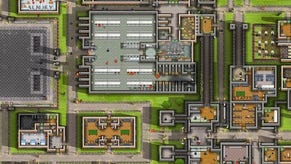The thorny issues of sexual assault and race in Prison Architect
"Video games are a strange medium."
"Have you considered including some of the more controversial and underhand elements that go on in jails?" I ask Chris Delay, Introversion's creative mastermind and the brains behind maximum security prison sim Prison Architect.
"Such as what?"
I have a feeling Chris knows exactly what I'm asking here, but wonders if I'm willing to ask him directly.
"Sexual assault. Stabbings. Verbal bullying. Trading in contraband."
"Most of those things you describe are in the game."
Of course they are. After all this is Introversion, the UK indie that created the wonderfully morbid Defcon, a game that saw players murder billions of virtual innocents with just a few mouse clicks. But still, it comes as something of a surprise to hear that Prison Architect, the game that rose phoenix-like from the ashes of the now cancelled Subversion, will ask the player to deal with, let's face it, issues that in video game land remain taboo.

"We didn't want to pick a tough topic like prisons and just make something completely cursory and surface level stupid," Delay says by way of explanation. "We wanted to do it properly. It is a game and there are concessions to it being a game. We're not out to make an experience that's utterly horrific to play. We're not aiming to make the player deeply uncomfortable.
"We're taking a topic which is interesting because it doesn't have any clear yes or no, good or bad answers, and we're making a game out of it. But we're certainly not going to make a game about prisons without dealing with a lot of the issues that occur in prisons."
"Does that include sexual assault?" I press.
"Why are you specifically asking about that?" I have a feeling Chris knows exactly why I'm asking this question, but wonders whether I'm willing to explain myself.
"It's not something developers normally deal with in games, so it'll be interesting if it does."
The concept is fresh in the memory. Only a few weeks ago Crystal Dynamics was forced to deny the suggestion that the new Tomb Raider game sees Lara Croft fend off a sexual assault - despite one of the designers claiming players will want to protect her after she suffers an attempted rape. All hell broke loose. It's a thorny issue.
"It's pretty much a no-go area for games, isn't it?" Delay ponders. "I will tell you we don't have that occurring anywhere in the game currently. It might be a step too far. It might be too much. But that said, I don't know. I haven't made the final decision on that."
"We're certainly not going to make a game about prisons without dealing with a lot of the issues that occur in prisons."
Prison Architect piques the interest on a number of levels. I'm amazed at the story behind its creation (the idea came to Delay during a tour of that famous prison, Alcatraz, and on the taxi drive home from the airport he fleshed the details out in the back seat - the driver was a former prison guard). I'm amazed that Delay convinced his Introversion colleagues to cancel Subversion after years of development. And I'm amazed no one has thought of making a game about a maximum security prison before now. At least, not one with a top-down perspective and cartoony graphics.
The result is a game that looks like what would happen if someone spliced Theme Hospital with Dwarf Fortress and popped the result behind bars. You begin by building your prison, spending cash, watching labourers do their work. Prisoners fill your prison. And then, there are problems.
It's these problems that will prove to be what's most interesting about Prison Architect. You have to deal with unrest and the hopes and dreams of your many inmates (they get bored easily), but on top of that you have to deal with stabbings, riots and all the rest of it. How you deal with them is up to you.
"The interesting thing for me is in a lot of internet discussions about Prison Architect some have wondered whether the game should even exist, or whether it's a topic that's just out of bounds for games and we shouldn't be making games about such a horrible topic," Delay reveals.
Rape may or may not make it into the game. Race issues, though, are cemented in stone. If sexual assault is video game taboo number one, surely racism is number two. And yet Delay is facing the problem head on.
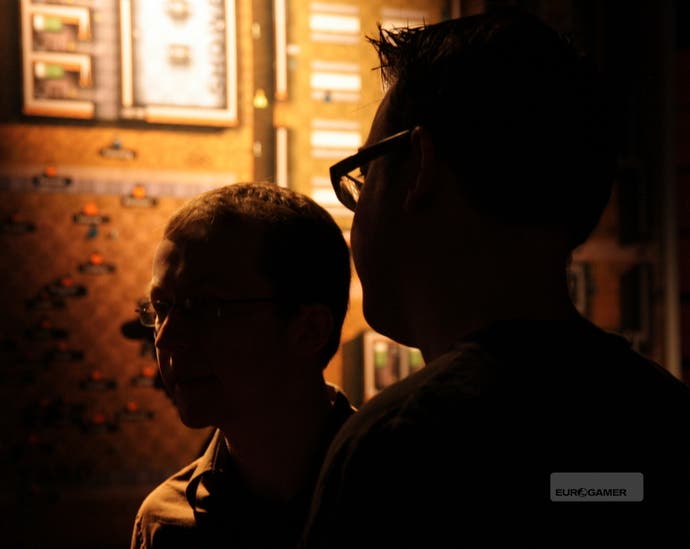
"You can also see the race issue comes up a lot in internet discussions about Prison Architect," he adds. "It's less of an issue in Britain. But America in particular has a lot of serious concerns about race, and it's associated with prison. So for Americans, prison and race are very closely related social problems. More so than they are in Britain."
"So how will you deal with that?"
"It's tricky. We're not Americans. We don't see the world in quite the same way. But it's certainly something we're conscious of.
"We had people complaining, rightfully so, that in one of the videos we put out all of the staff were white. The reason was there was only one sprite. It was a non-sinister reason, but it worries people that the game might end up being racist without meaning to be, or might deal with it wrongly."
"Will you change it?"
"No. Race is in the game and will be [a part of] the game. Race is going to be a causal factor in a lot of other things. The most obvious one is gang alignment. A lot of gangs are founded on racial terms. It's one particular race in one particular gang. It'll be interesting to see what the response is to that. We're treading so far into a zone that's difficult to deal with without offending people."
Games such as Prison Architect and Tomb Raider (despite what Crystal Dynamics would have you believe) force us to wonder whether video games should tackle difficult subjects (and by that I mean more difficult than whether to romance the pirate girl or the blue alien). They force us to wonder: are games ready for this kind of thing?
"There's no reason why games can't deal with much more serious topics. It's much harder. I'm very conscious of the fact you can't just trivially deal with issues like rape or race. You have to consider what it is you want to put in. It just makes it a lot harder."
Technically, of course they are. Games have, since day one, been capable of touching on these subjects. But developers have shied away from them - in part to avoid controversy and criticism, but mostly because there's no established way for video games to do rape or racism. We have an established language for shooting people in the face. There are no video game words for the player fending off a rapist as a young woman.
"There's no reason why games can't deal with much more serious topics," Delay insists. "It's much harder. I'm very conscious of the fact you can't just trivially deal with issues like rape or race. You have to consider what it is you want to put in. It just makes it a lot harder."
And it's at this point that video games and all of the rest of entertainment shoot off in different directions, because games require us to work. They're interactive, and that changes things.
"It's interesting," Delay says. "Video games are a strange medium. You could write a TV episode where a character suffers a sexual assault early on, and then the audience would empathise with that character later. But it's a very different experience if you, the player, are on the receiving end of that. You're much more directly involved, and that does actually change the meaning of everything.
"In many ways video games have it harder than any other medium when dealing with difficult social issues. You can look at TV, a series like The Wire, and it's full of racist characters and race conflict. All the controversial issues of race are directly dealt with head on, and there are characters that represent every different viewpoint. But nobody ever feels uncomfortable that the TV show itself is racist or that the writers themselves are trying to push an agenda.
"But when you transport that into the video game industry and the player is the primary agent, making things actually happen, it's a whole different experience and it creates a very different feeling. If you want to deal with difficult social issues, like rape or race, you've got to be aware of that."
It seems no one has worked out what to do about this problem yet, and why this is, is a whole other discussion. "I don't necessarily think it's even due to people not understanding video games," Delay says. So how can this problem be resolved?
"They're very difficult questions that will probably only be resolved by extremely talented writers getting involved and figuring out how to meld that craft with video games.
"When the main character is the player and their interactions with the world are limited in the way they are in video games, it's very different to when you're looking at a protagonist on screen."
And that is, essentially, what Prison Architect is all about. The player won't just watch a riot develop - the player will be charged with stopping it. The player won't just watch gangs form off the back of racial tension within their prison - they will have to diffuse them. And, perhaps, the player won't just have to watch uncomfortable moments in their prison showers - they will have to prevent them. And through that process, perhaps we'll establish the first few words in our limited vocabulary on how video games deal with these thorny issues.
